Chaplain Corps (United States Army)
The United States Army Chaplain Corps (USACC) consists of ordained clergy of multiple faiths who are commissioned Army officers serving as military chaplains as well as enlisted soldiers who serve as assistants. Their purpose is to offer religious church services, counseling, and moral support to the armed forces, whether in peacetime or at war.
| United States Army Chaplain Corps | |
|---|---|
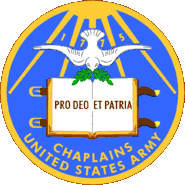 United States Army Chaplain Corps Branch Plaque | |
| Active | 29 July 1775 – present |
| Country | |
| Branch | |
| Type | Corps |
| Role | Military Chaplaincy |
| Size | 2,700 |
| Motto(s) | "Pro Deo et Patria" (Latin: For God and Country) |
| Colors | Black |
| Engagements | American Revolutionary War American Civil War Spanish–American War World War I World War II Korean War Vietnam War Gulf War Somali Civil War Kosovo War War in Afghanistan Iraq War |
| Website | Official Website |
| Commanders | |
| CCH | CH (MG) Thomas L. Solhjem |
| DCCH | CH (BG) William Green Jr. |
| Notable commanders | CH (COL) John T. Axton CH (MG) William R. Arnold CH (MG) Francis L. Sampson CH (MG) Kermit D. Johnson CH (MG) Patrick J. Hessian CH (MG) Gaylord T. Gunhus |
| Insignia | |
| Branch Insignias | 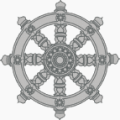  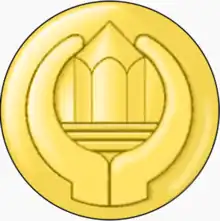  |
| Distinctive unit insignia | 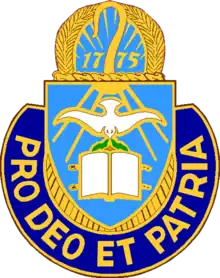 |
U.S. Army Institute for Religious Leadership
The U.S. Army Institute for Religious Leadership (USAIRL) is part of the Armed Forces Chaplaincy Center (AFCC), which also includes the Air Force Chaplain Service Institute (AFCSI) and the U.S. Naval Chaplaincy School and Center (NCSC). The three schools are co-located at Fort Jackson, in Columbia, S.C.[3]
In 2005, the Base Realignment and Closure Commission decided to put all military ministry training at the same location. While it was authorized, funding was not part of the BRAC, and the Air Force departed Ft Jackson in 2012, currently leaving only the Army and Navy at the Armed Forces Chaplaincy Center.[3]
The purpose of the AFCC was to have closer cooperation among the three chaplain corps and to share instruction and training. While that was the goal, the core curricula were maintained by the three service schools and a joint program of instruction (POI) was never created.[3]
The U.S. Army Chaplain School was approved on 9 February 1918. Its first session began on 3 March 1918, at Fort Monroe, Virginia.[4] Chaplain (MAJ) Aldred A. Pruden, who developed the plan for the school, was named the first commandant of the school.[4] It subsequently moved to Camp Zachary Taylor (Kentucky), Camp Grant (Illinois), Fort Leavenworth (Kansas), Fort Benjamin Harrison (Indiana), Harvard University (Massachusetts), Fort Devens (Mass.), Fort Oglethorpe (Georgia), Carlisle Barracks (Pennsylvania), Fort Slocum (New York) (1951–62), Fort Hamilton (N.Y.) (1962–74), Fort Wadsworth (N.Y.) (1974–79), and Fort Monmouth (New Jersey) (1979–95).[4]
Noncombatant status
Chaplain Candidate
Due to a revision of DA PAM 611-21 (Military Occupational Classification and Structure) Effective 1 October 2013, Chaplain Candidates, previously belonging to the Staff Specialist Branch until ordination have worn the Staff Specialist insignia in lieu of religious denomination insignia. The transition from the Staff Specialist Branch to the Chaplain Branch left the candidates without an authorized branch insignia. Responding to the need, Chief of Chaplains Chaplain (Major General) Donald L. Rutherford submitted a request for collar insignia which was approved by HQDA, G-1 on 23 February 2012. The design for the collar insignia was authorized on 18 June 2012.[5]
Religious Affairs Specialist or NCO
Specialty insignia
For FAQs regarding uniforms and insignia, see footnote[6]
Chiefs of Army Chaplains
The Chief of Chaplains of the United States Army is the head of the Army Chaplaincy. The position was created to better organize the corps. The current Chief of Chaplains is Chaplain (Major General) Thomas L. Solhjem became the United States Army's 25th Chief of Chaplains on 31 May 2019.[7]
Army bases chaplaincy
See footnotes[8][9] For a link to the chaplaincy at each of the bases listed below, see general footnote[10] and the footnote following each base
Joint-base chaplaincy
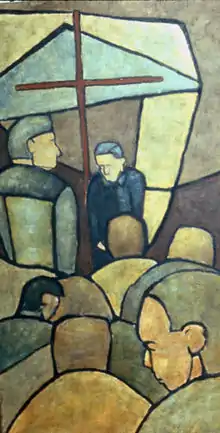
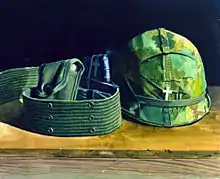

U.S. Military Academy chaplaincy
Chapels
For all six USMA chapels, see footnote[25]
Chaplains
See footnote[26]
Cadet Prayer
See footnote[27]
Museum
For USA Civil War chaplains, see footnote[28] For historic photographs of Army chaplains in World War I, World War II, the Korean War, and the Vietnam War, see footnote[29]
The U.S. Army Chaplain Museum is located at Fort Jackson, South Carolina.[30] It was established on 14 August 1957, at the then–United States Army Chaplain School at Fort Slocum, New York. It was dedicated on 10 February 1958, by Chaplain (MG) Patrick J. Ryan, Chief of Chaplains.[31]
"The Four Chaplains"
When the troop-transport ship Dorchester was torpedoed during World War II, four Army chaplains ministered to the soldiers and sailors on the sinking ship, gave up their life jackets, and sacrificed their lives when the ship sank.[32] Those chaplains – known as "The Four Chaplains" – were Lt. George L. Fox, Methodist; Lt. Alexander D. Goode, Jewish; Lt. John P. Washington, Roman Catholic; and Lt. Clark V. Poling, Dutch Reformed.
Other notable chaplains
- Patrick J. Boyle – Colonel, US Army, Roman Catholic Chaplain for the 82nd Airborne Division and 1st Air Cavalry Division, serving three tours during the Vietnam War. Awarded two Silver Stars, three Bronze Stars, Air Medal, and Parachutist Badge.
- John G. Burkhalter – Chaplain during World War II and the Korean War.
- John B. DeValles – Chaplain during World War I.
- Francis P. Duffy – Chaplain during World War I, the most highly decorated cleric in the history of the U.S. Army.
- John H. Eastwood – Chaplain during World War II[33]
- Herman G. Felhoelter – Chaplain during the Korean War. Killed in Chaplain–Medic massacre.[34]
- Augustus F. Gearhard - US Army Catholic chaplain who received the Distinguished Service Cross during World War I, then the Silver Star and Legion of Merit during World War II as a chaplain in the Army Air Forces. Transferred to US Air Force in 1947 and retired as a brigadier general in 1953 after serving as Deputy Chief of Chaplains of the Air Force.[35]
- Dale Goetz – Chaplain during Afghanistan War. First U.S. Army chaplain to be killed in action since the Vietnam War.[36]
- Milton L. Haney – Chaplain during the Civil War. Called "The Fighting Chaplain" by the men of the 55th Illinois Infantry. Awarded the Medal of Honor
- Philip Hannan – Chaplain during World War II.
- Emil J. Kapaun – Chaplain during the Korean War. Died in a POW camp on 23 May 1951. In the process of canonization; awarded the Medal of Honor posthumously in April 2013[37]
- Abraham Klausner – Chaplain during and after World War II who cared for the more than 30,000 survivors found at Dachau concentration camp, shortly after it was liberated in April 1945, as well as for thousands more in other Displaced Persons camps in southern Germany.[38]
- Charles Liteky – Chaplain during Vietnam War. Awarded the Medal of Honor.
- John McElroy, SJ – One of two of the Army's first Catholic chaplains. Chaplain during the Mexican–American War, founder of St. John's Literary Institute, Boston College High School, and Boston College.[39]
- Colman O'Flaherty – Chaplain during World War I. Awarded the Distinguished Service Cross posthumously.
- John D. McCarty – A Protestant Episcopal priest, he served as U.S. Army chaplain at the front, during the Mexican–American War, with General Scott's army.
- Mark Nordstrom – Anglican chaplain during Operation Iraqi Freedom and bishop in the Anglican Church in North America.
- Chaim Potok – Jewish chaplain during the Korean War, author.
- Anthony Rey, S.J. – One of two of the Army's first Catholic chaplains. Chaplain during the Mexican–American War and Vice President of Georgetown College (1845). First Catholic chaplain killed during service with the U.S. military.
- John Rosbrugh – Chaplain during the Revolutionary War. First U.S. chaplain killed in battle.
- Jeff Struecker – Chaplain for the 75th Ranger Regiment. Prior to chaplaincy, was a sergeant and squad leader of Task Force Ranger during the Battle of Mogadishu. Awarded Bronze Star with Valor device and two oak leaf clusters.[40]
- H. Timothy Vakoc – Chaplain during Iraq War. The only U.S. military chaplain to die from wounds received in the Iraq War.
- Charles J. Watters – Chaplain during the Vietnam War. Awarded the Medal of Honor posthumously.
- Pratima Dharm - First Hindu Chaplain.[41]
- George Wood - Chaplain for the 505th Parachute Infantry Regiment and later for the 82nd Airborne Division during World War II. Only chaplain to have made four combat jumps in World War II. Wood Memorial Chapel in Fort Bragg, NC is named in his honor.[42][43]
- Matthew A. Zimmerman Jr. – The 18th Chief of Chaplains of the United States Army from 1990 to 1994 and the first African American to hold the position.
Hymn
- Eternal Father, Strong to Save (including special verses for West Point cadets, U.S. armed forces, wounded in combat, and for those deployed)
See also
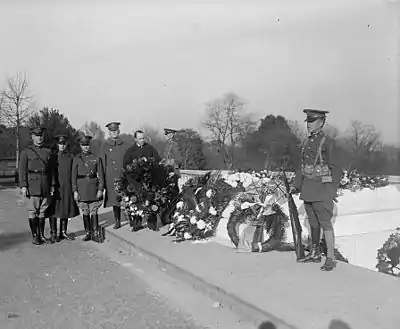
- United Church, The Chapel on the Hill (former Army chapel)
- United States military chaplains
- United States Air Force Chaplain Corps
- United States Navy Chaplain Corps
- Religious Programs Specialist (Navy)
- Chaplain of the Coast Guard
- Chaplain of the United States Marine Corps
- Armed Forces Chaplains Board (AFCB)
- Chaplains Hill (Arlington National Cemetery)
- List of US Army Chaplain Corps Regimental Awards
- Insignia of Chaplain Schools in the US Military
- Maryland Defense Force Chaplain Corps
Footnotes
- Army Chaplain Corps: Chaplain Basic Officer Leadership Course Archived 6 January 2010 at the Wayback Machine. GoArmy.com. Retrieved 4 March 2010.
- Training Directorate Archived 29 March 2010 at the Wayback Machine. (United States Army Chaplaincy official homepage). Retrieved 4 March 2010.
- "First Group of Navy Chaplains Graduate from NSCS Fort Jackson". Navy.mil (USN official website), 11/10/2009. By Steve Vanderwerff, Naval Education and Training Command Public Affairs. Retrieved 3 December 2009.
- Chaplaincy History & Museum: History of Chaplain Corps Archived 31 March 2010 at the Wayback Machine. US Army Chaplain Corps (United States Army Chaplaincy official homepage). Retrieved 4 March 2010.
- "Chaplain Candidate". Archived from the original on 6 June 2014. Retrieved 3 June 2014.
- Chaplaincy History & Museum: FAQ's Archived 31 March 2010 at the Wayback Machine (United States Army Chaplaincy official homepage). Retrieved 5 March 2010.
- army.mil/article/222778/chief_of_chaplains
- Wise, Jeremy (Army Flier Staff) (18 February 2010). "Fort Rucker officials break ground on new post chapel". Army.mil. Retrieved 5 March 2010.
- Schuette, Rob (Fort McCoy Public Affairs) (12 January 2010). "Fort McCoy chapels get major makeovers". Army.mil. Retrieved 5 March 2010.
- Go to Office of the USMA Chaplain and click on "Links" in left-hand column. USMA website. Retrieved 4 March 2010.
- At Fort Carson official website, go to "Services" and click on "Chaplain". For photos of the five chapels, then click on "Chapels at Fort Carson". Retrieved 2011-08-19.
- Fort Gordon Chaplain & Ministry Team Archived 14 August 2011 at the Wayback Machine. Fort Gordon Garrison official website. Retrieved 2011-08-19.
- Office of the Senior Chaplain Archived 19 October 2011 at the Wayback Machine. Fort Knox official website. Retrieved 2011-08-19.
- Command Chaplain. U.S. Army Combined Arms Center (CAC) official website. Retrieved 2011-08-19.
- Religious Services Archived 7 February 2011 at the Wayback Machine. Fort Monroe official website. Retrieved 2011-08-19.
- Home page Archived 3 September 2011 at the Wayback Machine. Fort Polk Command Chaplain Office official website. Retrieved 2011-08-19.
- Fort Polk Chapels Archived 1 October 2011 at the Wayback Machine. Fort Polk Command Chaplain Office official website. Retrieved 2011-08-19.
- Religious Support. Fort Sill official website. Retrieved 2011-08-19.
- Fort Sill Chapels. Fort Sill official website. Retrieved 2011-08-19.
- Joint Base Lewis-McChord Chaplaincy Archived 10 July 2006 at the Wayback Machine official website. Retrieved 2011-08-19.
- Fort Dix Command Chaplain Section Archived 5 August 2011 at the Wayback Machine (including Soldiers Chapel and Dix Chapel). Army Support Activity–Dix (ASA-Dix) official website. Retrieved 2011-08-19.
- JB Chapel Schedule Archived 21 February 2011 at the Wayback Machine (and contact information) (McGuire Chapel, North Chapel, Dix Chapel, Chapel of the Air). JB MDL Chapel official website. Retrieved 2011-08-19.
- Home page Archived 8 February 2012 at the Wayback Machine. JB MDL Chapel official website. Retrieved 2011-08-19.
- JB MDL Chapels Archived 9 July 2011 at the Wayback Machine. JB MDL official website. Retrieved 2011-08-19.
- Go to Office of the USMA Chaplain and click on "Chapels" in left-hand column. USMA official website. Retrieved 23 December 2009.
- Go to Office of the USMA Chaplain and click on "Chaplains" in left-hand column. USMA official website. Retrieved 23 December 2009.
- Go to Office of the USMA Chaplain and click on "Cadet Prayer" in left-hand column. USMA official website. Retrieved 23 December 2009.
- "USA Chaplains". The National Civil War Chaplains Museum. Retrieved 20 October 2011.
- Chaplaincy History & Museum: Historic Photos Archived 29 March 2010 at the Wayback Machine (World War I, World War II, Korean War, Vietnam War). US Army Chaplain Corps (United States Army Chaplaincy official homepage). Retrieved 5 March 2010.
- "Fort Jackson's U.S. Army Chaplain Museum". Chaplain Regimental Museum Association. Retrieved 2 December 2014.
- Chaplaincy History & Museum: History Archived 31 March 2010 at the Wayback Machine (United States Army Chaplaincy official homepage). Retrieved 4 March 2010.
- The Four Chaplains Memorial Foundation. Retrieved 1 December 2009.
- Shepherd, Raymond F. On Wings of the Wind. pp. 62–64.
- At the following webpage, scroll down to "Captain Herman G. Felhoelter • Korean War • 1914-1950". Centner, Pat. "No Greater Love: A Memorial Day Salute to Military Chaplains". American Family Association. Archived from the original on 25 April 2012. Retrieved 6 November 2011.
A Catholic priest from Washington state, Chaplain Herman Felhoelter had been assigned to the U.S. Army's 19th Infantry Regiment. ... Four days before his death, he had written his mother: 'Don't worry, Mother. God's will be done. I feel so good to know the power of your prayers accompanying me. ... I am happy in the thought that I can help some souls who need help. ...'
- "Chaplain (Brig. Gen.) Augustus F. Gearhard".
- Capt. Goetz joined the Chaplain Corps in 2000. Before that, he was pastor of the First Baptist Church in White, South Dakota. https://www.facebook.com/notes/1st-brigade-4th-infantry-division/raider-brigade-remembers-iron-knights-chaplain-cpt-dale-goetz/434322338186 "Army: Chaplain is 1st killed in action since '70: Captain based at Fort Carson, Colo., had hitched ride on supply convoy". NBC News. 2 September 2010. Retrieved 2 September 2010.
- www.whitehouse.gov
- Stewart, Jocelyn Y. (4 July 2007). "Abraham J. Klausner, 92; rabbi was an advocate for Holocaust survivors". Los Angeles Times. Retrieved 4 July 2007.
- O'Conner, Thomas H. "Breaking the religious barrier", The Boston Globe, Boston, 10 May 2004.
- "INTRODUCTION OF CAPTAIN JEFF STRUECKER AS GUEST CHAPLAIN -- (House of Representatives - July 23, 2002)". The Library of Congress. Archived from the original on 14 April 2020. Retrieved 22 December 2014.
- "Pratima Dharm is US Army's first Hindu chaplain". Hindustan Times. 4 June 2011. Retrieved 13 November 2021.
- Beatty, John David (31 December 2020). "Rev. George Bartlett Wood". The Archives of the Episcopal Diocese of Northern Indiana. Archived from the original on 15 December 2021. Retrieved 14 December 2021.
With the outbreak of World War II, Wood entered the chaplain school at Fort Benjamin Harrison near Indianapolis. He later volunteered for parachute duty and was attached initially to the 505th Parachute Infantry Regiment, by-passing the usual school for parachutists, and then was sent to Fort Bragg to join the 82nd Airborne Division. An elite military unit, the 82nd was deployed to North Africa and then became part of the invasion of Sicily in 1943. He later dropped behind enemy lines in Salerno and participated in the allied march to Naples. He was then sent to England for additional training and took part in the D-Day invasion in 1944, parachuting into Ste. Mere Eglise in Normandy. He took part in a fourth combat jump in Holland and was the only chaplain to make four jumps in the war.
- Mrozek, Steven J. (15 June 2000). 82nd Airborne Division. Turner Publishing Company. p. 191. ISBN 978-1563113642. LCCN 97060398. OCLC 52963023. OL 704174M.
Further reading
- Bergen, Doris L. The Sword of the Lord: military chaplains from the first to the twenty-first century (Univ of Notre Dame Press 2004)
- Honeywell, Roy John. Chaplains of the United States Army (Office of the Chief of Chaplains, Department of the Army, 1958)
- Pickard, Scott D. "Co-workers in the field of souls: the Civil War partnership between Union chaplains and the US Christian Commission, 1861–1865." (2013). online
- Shea, Michael E. Sky Pilots: The Yankee Division Chaplains in World War I (2014)
- Stover, Earl F. The United States Army Chaplaincy (Office of the Chief of Chaplains, Department of the Army, 1977)
- O'Malley, Mark. An History of the Development of Catholic Military Chaplaincy in the United States of America (Gregorian University, Rome, 2009)
External links
- US Army Chaplain Corps (United States Army Chaplaincy official homepage). Retrieved 2010-03-04.
- U.S. Army Chaplaincy (DACH). Army.mil/Chaplaincy. Retrieved 2010-03-05.
- Army Chaplain Corps: Overview. GoArmy.com. Retrieved 2010-03-04.
- Army Chaplain Corps: About Army Chaplains. GoArmy.com. Retrieved 2010-03-04.
- Army Chaplain Corps: Chaplain Candidate Program. GoArmy.com. Retrieved 2010-03-04.
- US Army Chaplain Center & School website. Retrieved 2011-02-24.
- Chaplaincy Museum (U.S. Army Chaplaincy official homepage). Retrieved 2011-02-24.
- Zach Morgan (Fort Polk Guardian staff writer), Chaplain Corps crucial to Army. Army.mil. 19 February 2010. Retrieved 2010-03-05.
- Kelvin Davis (Chief of Chaplains), Civilian Clergy Resources: Ministering to Families Affected by Military Deployment. 4 June 2009. Army.mil (U.S. Army official homepage). Retrieved 2010-03-05.
- Military Chaplains Association (MCA) official website. Retrieved 2009-12-03.
- National Conference on Ministry to the Armed Forces (NCMAF) official website. Retrieved 2009-12-03.
- The Four Chaplains Memorial Foundation official website
- Library of Congress audio and video history interviews of former U.S. military chaplains
- The short film Big Picture: Opportunity to Learn is available for free viewing and download at the Internet Archive.
- The short film Big Picture: The Army Chaplains is available for free viewing and download at the Internet Archive.
